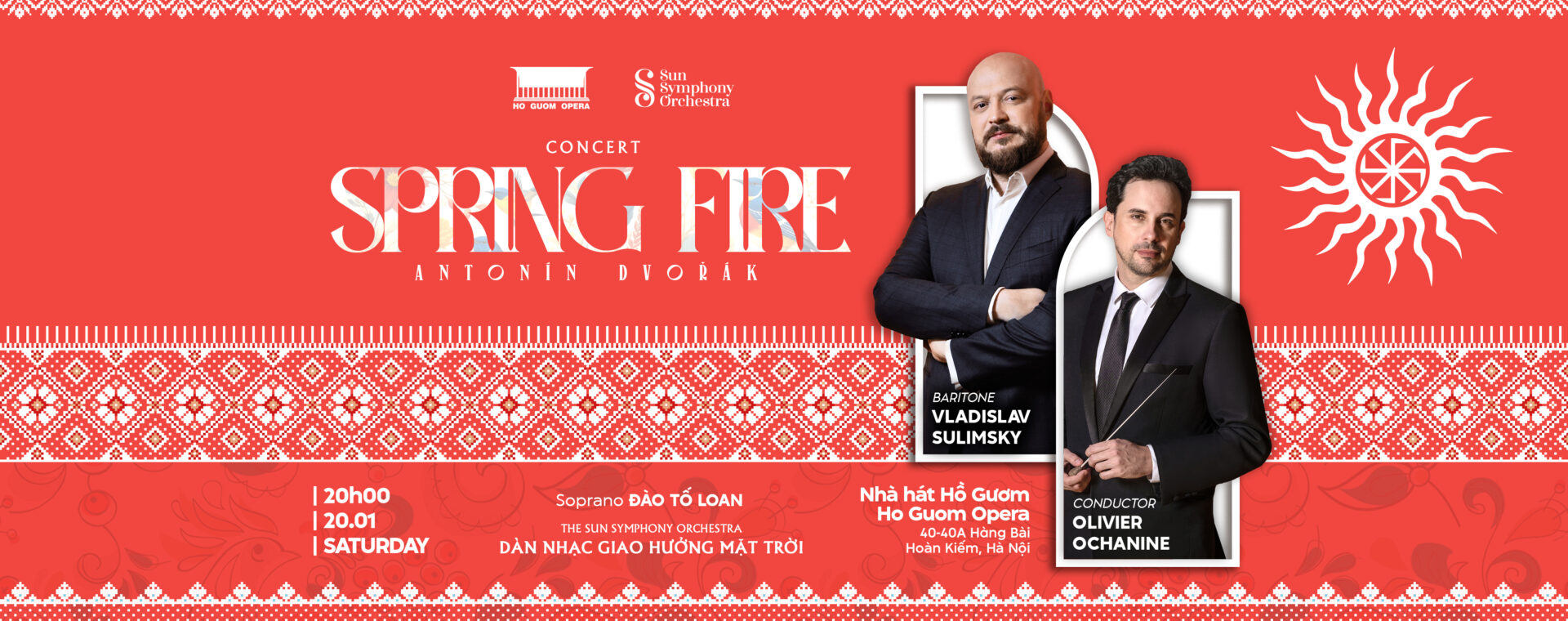Short description
This coming January 20 (Saturday) at 8:00pm, the Sun Symphony Orchestra with Music Director Olivier Ochanine present a really special concert featuring one of the most exciting baritones in the world, Vladislav Sulimsky, who joins for the Vietnam Premiere of the gorgeous Biblical Songs of Antonín Dvořák.
Antonín Dvořák
Carnival Overture, op. 92
Văn Cao
Mùa Xuân Đầu Tiên arranged by (A. Oon) for orchestra and soprano
Antonín Dvořák
Biblical songs, op. 99 for voice and orchestra (Vietnam Premiere)
Antonín Dvořák
Symphony No. 9 in e minor “From the New World” op. 95, B. 178
The most famous Czech composer is without a doubt Antonin Dvořák, from whom we feature 3 very contrasting works, all of the same composition period – 1891-1895. Admired by the likes of German composer (and friend) Johannes Brahms, not usually one to encourage fellow composers, and classical musical lovers ever since, Dvořák made a name for himself with a multitude of delightful symphonies, piano works, chamber music, and vocal works. Tonight, you will hear his most famous overture (Carnival) and symphony (“From the New World”), along with a much less frequently performed vocal cycle – the Biblical Songs’ first-ever Vietnam performance.
Dvořák took a long while to gain success as a composer, remaining rather poor and not achieving any prominence until his late 30s. By the year 1891, Dvořák was viewed as a sort of cultural nationalist who could inspire young American composers and help to establish an American school of composition; he was thus invited to New York to become the director of the National Conservatory of Music. The next four years saw him experience prolific composing and honors. The Carnival Overture was the middle work of a trilogy of overtures originally entitled “Nature, Life and Love”. The Carnival represented the “life” element, with its exuberance and flair; it shows the high-spirited tumult of a carnival setting. The middle section features a beautiful, gentle passage depicting a pair of “straying lovers” amidst the boisterous excitement of the carnival. The overture is one of the most exciting concert overtures, and contains a virtuosic part for the tambourine which adds great energy to the overall party.
Dvořák was a very religious man; but unlike other composers (Bach, Bruckner, Rachmaninov, etc.), Dvořák hadn’t composed all that much based on religious. There are his requiem and Stabat Mater. Then there are his Bibilical Songs from 1894, a work of great spiritual depth – 10 songs for low voice and piano (then orchestrated) wherein the singer speaks to God of his anxieties, trust and joy. The text is taken from David’s Book of Psalms, and the Czech version of the text is paired with music in an incredibly moving way. The compositional techniques Dvořák uses are also manifold, from a simple recitative evoking quiet prayer, to beautiful melodies accompanied by some stunning harmonic progressions. The Sun Symphony Orchestra is thrilled to feature the premiere of this gorgeous work.
The most famous composition of Dvořák’s entire output is his symphony “From The New World”. This symphony was composed during his first year in America (not long after Carnival). Dvořák’s recent successes and his subsequent elevated, creative energy contributed to the genesis of a work of exceptional quality. The symphony uses characteristic elements of African American and Native American music. A characteristic feature of the composition is the frequent reminiscence of themes from previous movements at crucial points in each subsequent movement, a principle which gives the symphony its homogeneous expression. Dvořák had used this approach many times in the past, but never with such consistency and deliberation. The famous English Horn melody in the second movement (later popularized by his student’s use of it in a song entitled ‘Goin’ Home’) is written in a way to emulate the many negro spirituals he had heard while in America. The voice of baritone singer Harry Burleigh is said to have inspired Dvořák to use the English Horn for the solo that was initially meant to be played by a clarinet. The soulful quality of the English Horn has led to one of the most recognizable melodies in all of classical music. Conjecture has it that Dvořák began to feel homesick, and that the melancholy of the slow movement is a byproduct of this longing.
The success of the symphony was immediate and lasting. An interesting bit of trivia is that the tuba plays for only a few bars, and in only the second movement. Even in the climactic passages of the exciting finale, there is no tuba. One tale has it that the composer became annoyed by a tuba player’s indecent closeness with Dvořák’s wife that he decided to add a symbolic tuba part that would require the tubist to join the orchestra’s upcoming tour, effectively keeping him away from Dvořák’s wife. This remains a fun tale and has never been proven.
A bonus work on tonight’s concert is a beautiful song by legendary Vietnamese composer Văn Cao – Mùa Xuân Đầu Tiên (First Spring). The SSO’s first spring concert, after all, deserves a beautiful song about spring – tonight’s concert features a brand new arrangement by Principal Horn Alexander Oon.
—————————–
Ticketing: 500.000đ | 800.000đ | 1.000.000đ | 3.000.000đ | 5.000.000đ
Hotline (Free delivery in Hanoi): 0965 765 946 – 0913 489 858
